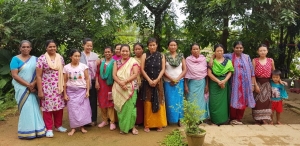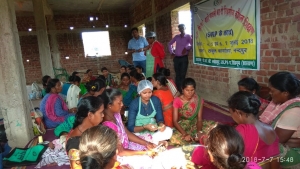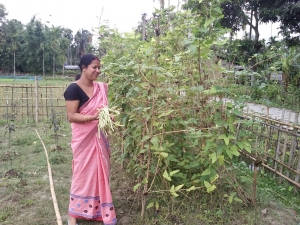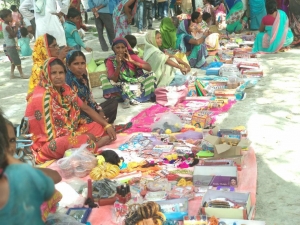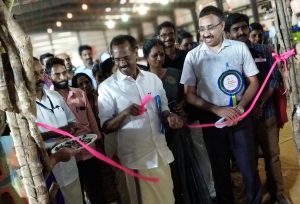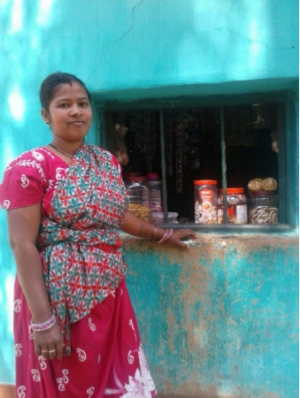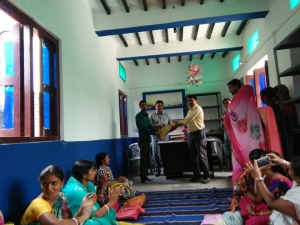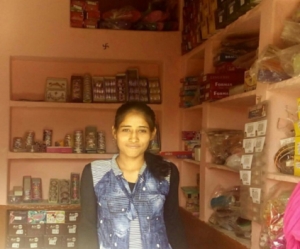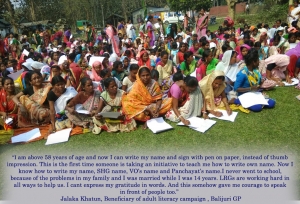Kudumbashree NRO
When ten women stepped in to light the streets of their village
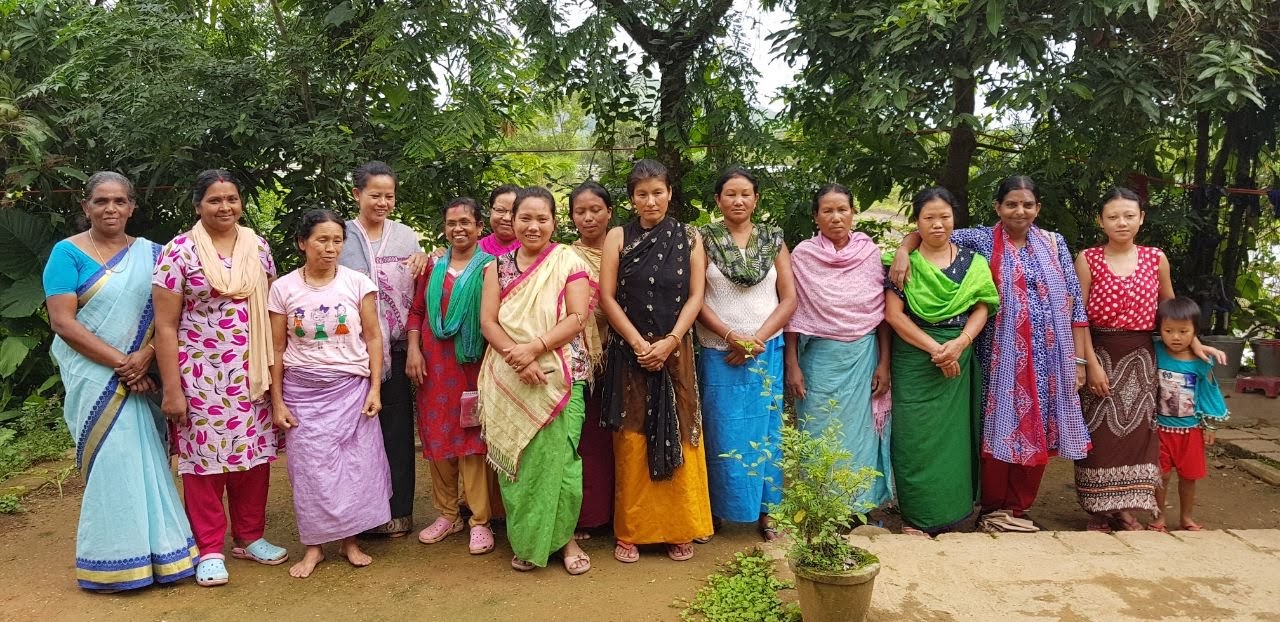
The SHG Women with KS-NRO Mentors
Keirao Khunou village, located in Keirao Bitra Sub Division of Imphal East district, lies a cluster of 24 households of Meitei community. The cluster is located in the interiors of the village and the families have been living there for the past 10 years. Since last one year, the people have been facing problems due to unpaved roads and street lights that weren’t functioning. During heavy rains, it was a challenge for the locals to walk through the eroded road without proper lighting. In spite of repeated requests to the Panchayat and even placing the demand in the Gram Sabha, the issue was not taken up.
To put an end to this problem, one of the SHGs in the village decided to intervene. Among the SHG women, there were three Local Resource Group (LRG) members who were selected and trained to be part of the PRI-CBO Convergence Project in the village. The LRGs were instrumental in bringing up the issue and the need to address it urgently for the common good of the village. After consulting with the mentors of Kudumbashree National Resource Organisation (KS-NRO), the SHG women including the LRGs decided to approach the electricity department through a common contact working as a line worker. On March 2018 the efforts of these women were rewarded when 18 street lights were repaired and a meter was installed. The expenses were met from the SHG savings of the members. As the next step, women mobilised other village members for paying the monthly electricity bill collectively which comes around Rs.1000 for two and half months.
The ten women of the SHG group have lighten the streets of their village and have set an example that women have the capability of working towards the solution of any problem. As an SHG group they were strengthened to identify local issues affecting them and found a way to address it. The women now feel driven to work towards other development activities of the village. Their next aim is to resolve the problem of water scarcity.
They say “We want our village to have all the basic facilities and we will work hard to make it happen”.
Training on value added products from Jackfruit
Manoharpur Block, located in West Singhbhum district of Jharkhand has plenty of natural products like Jackfruit, Mahua and Tendu leaves that can be utilized for making value added products. But due to lack of awareness on the utility of these products, every year these products gets wasted. The BRC of Manoharpur Block with the help of CRP-EPs identified this gap and an initiative to set up enterprises for producing value added products from these natural resources was thought of. The Block Resource Centre (BRC) of the block had already been organizing skill training and business related training programmes for entrepreneurs like General Awareness Training (GAT) and Business Motivation Training (BMT) through its CRP-EPs under SVEP.
A four day training program was organized from 4th to 7th July 2018 which was participated by a total of four clusters comprising of 70 SHG members. The four clusters were trained into two batches. The first batch had the clusters Nandpur, Baranga, and Panchpaiya and the second batch had clusters Dhipa and Baranga. Each batch was given two days of training. The trainings were carried out by Yasharth Consultancy Group, an MEC group from Maharashtra which was set up when enterprise development initiatives were being implemented by KS-NRO during 2017 in the state. Trainers Madhavi and Pradisha from the consltancy group who had come from Maharashtra initially listed out the kind of products that could be made out of Jackfruit.
| Sr. No. | Products |
| 1 | Pickle |
| 2 | Chutney |
| 3 | Papad |
| 4 | Sabji |
| 5 | Chakli |
| 6 | Poodi |
| 7 | Bhajiya (Chap) |
| 8 | Kheer |
| 9 | Chips |
| 10 | Poli |
| 11 | Dry fruits |
| 12 | Ada |
| 13 | Halwa |
| 14 | Cutlet |
| 15 | Laddoo |
Practical demonstrations on making seven type of products from Jackfruit were given like making Chips, Jackfruit Bhajiya (Chap), Biscuits, Papad, Chatani, Poodi and Cutlet. It was also decided that a Mela would be organized for selling and promoting the products made during the training program in Manoharpur weekly market. At the end of each day of the training program, participants were also given raw materials for practicing and preparing these products at home. The SHG members prepared the items at home and used to bring it the next day of the training program which would then be tasted by the trainers, guest visitors, Block Project Officers (BPO) and even mentors. Evaluation of the training was also done for each day of the training. The training saw a good response as more SHG women were interested to be part of it. As the participants got feedback on a daily basis, it helped them in learning and improving the skill of making products from the fruit. There was a positive feedback overall by guest visitors and the mentors who agreed that an enterprise on such value added products has a huge scope considering its low investment.
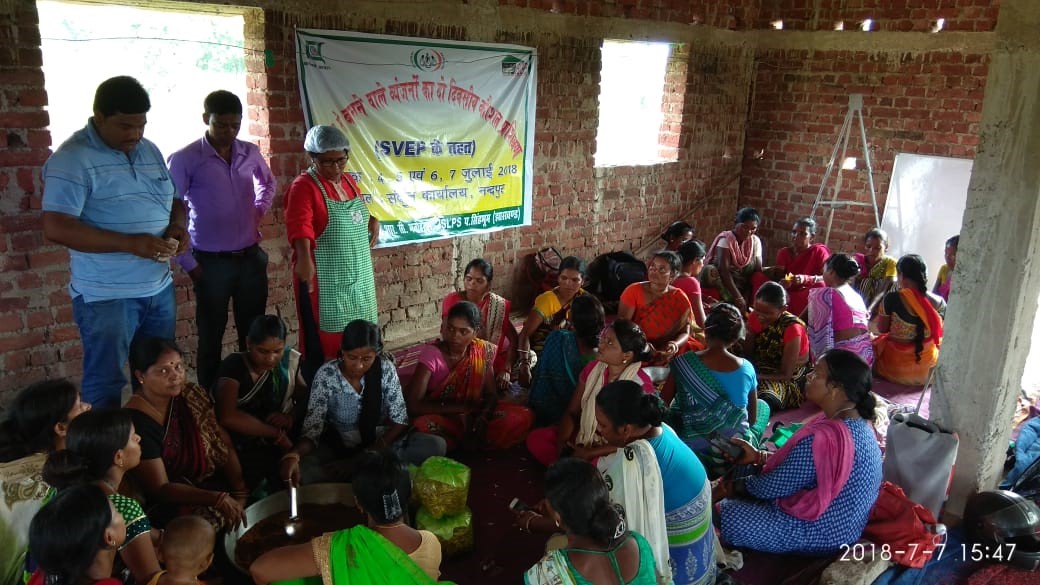
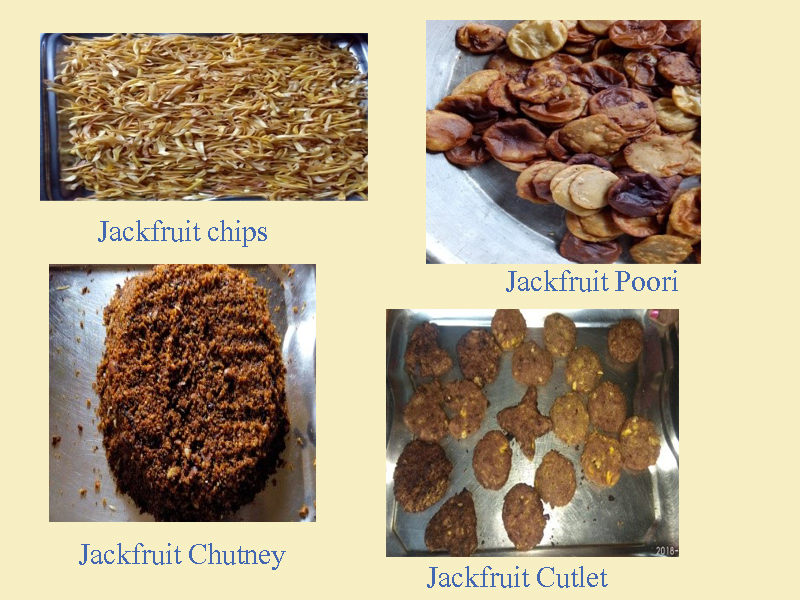
Kitchen Garden- An Initiative towards Organic Livelihood
“ I am happy to say that now my child is able to consume vegetables which are free from pesticides and my expenditure has been reduced towards shopping of vegetables which are grown with deadly chemicals”-Khaleda- Masood SHG, Gupteshwar GP.
Introduction
Kitchen Garden initiative was first started under Borsola block in Borbhogia Gram Panchayat. The idea is to provide organic vegetables to SHG women. It was observed that in many houses across different Gram Panchayats there has been a lot of vacant space in the back yard of each house hold. Thereafter, it was during our line department orientation the CPDO of ICDS department raised the problem of mal nutrition among the children under Borsola block. As part of our VO orientation the women were asked about their interest on the concept of building a vegetable garden in their house hold. The SHG women showed interest in the concept and thereafter the process was initiated with the help of agriculture department.
How was the problem identified?
i) Malnutrition status from ICDS:- Data was collected from ICDS department which revealed the problem the problem of malnutrition among children of different households. The data was shared with the agriculture department by the Internal mentors.
ii) Meeting s with SHGs and VOs: Meetings were conducted among each SHG to explain the concept to kitchen garden and its various benefits. The meetings were conducted by the LRGs of respective Gram Panchayats.
Process towards Action
i) Meeting with Agriculture department:- After the initial meeting was held it was advised by the department official to arrange for a meeting with the community which would have representatives both from department, BMMU and presence of Internal Mentors and LRGs.
ii) Motivational classes to VO by Agriculture Department:- ADO and Extension Officer has asked the Internal Mentors and LRGs to ensure participation from community towards this initiative. The meeting was first conducted in Borbhogia Gram Panchayat which had good number in terms of participants. The officials had given them awareness on the health hazards involved in the vegetables which are sold in the market. ADO also spoke about the nutritional value of the different vegetables and the benefits of organic vegetables.
iii) Survey by LRGs:- A format was prepared by agriculture department for conducting the survey. The formats comprised of the amount of land a beneficiary posses, daily consumption of vegetables and number of members in the family. A photograph should also be taken of the land in order to assess the amount of vegetables which can be grown.
iv) Finalization of beneficiary by LRGs and VOCC:- Once the survey was completed the formats were shared to the agriculture department and VOCC. The VOCC and agriculture department scrutinized the formats and a list was finalised by the VOCC and LRGs.
v) Technical training by Agriculture Department: Technical training was provided by ADO to the identified beneficiaries at the Gram Panchayat premises and VOCC rooms. The session comprised pictorial presentations of various models of kitchen garden across the country. A diet chart comprising of the nutritional value of each vegetable was also shown.
vi) Preparation of kitchen garden beds and distribution of seeds: In order to build a model plot for kitchen garden the plot was identified in Borghogia Gram Panchayat. Training was given by the department as to how the beds should be maintained and a seasonal calendar was provided to identify the time of each vegetable which could be grown. The bed size was modified based on the amount of land which the beneficiary has in the backyard. The department has also provided with seeds for ladies finger, brinjal etc. But, in order to make the model sustainable the SHG women were asked to purchase their own seeds and reduce their expenditure on purchase from market on vegetables.
vii) Regular monitoring by Department, VOCC and LRGs: Agriculture department has been constantly monitoring the progress of the initiative by random visits to the field. A group was also opened in consultation with BMMU and regular updates are taken by the ADO from the different VOCC coordinators.
viii) Food Habits: It was observed during the interaction in field the families of SHG women were consuming food which didn’t have much of a nutrition advantage.
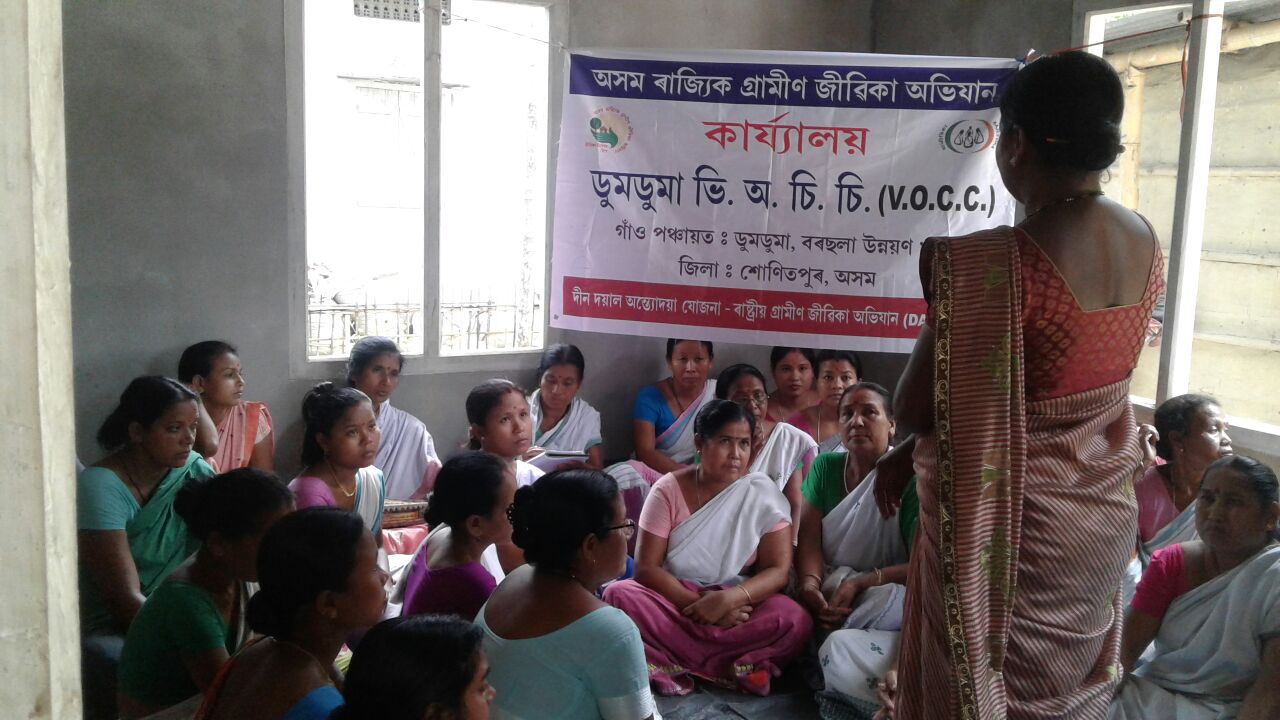
Role of VOCC:- After the initial meeting was conducted VOCC was made to organise training along with the support from Agriculture department. The mobilization was done by LRGs and the initiation was done by VOCC. The VOCC members also verified the list of beneficiaries along with the Agriculture department. Moreover, constant follow up is being carried out by VOCC and the trainings are organised by VOCC members at regular intervals. On the other hand, VOCC inspects each and every house olds along with the growth in each vegetables.
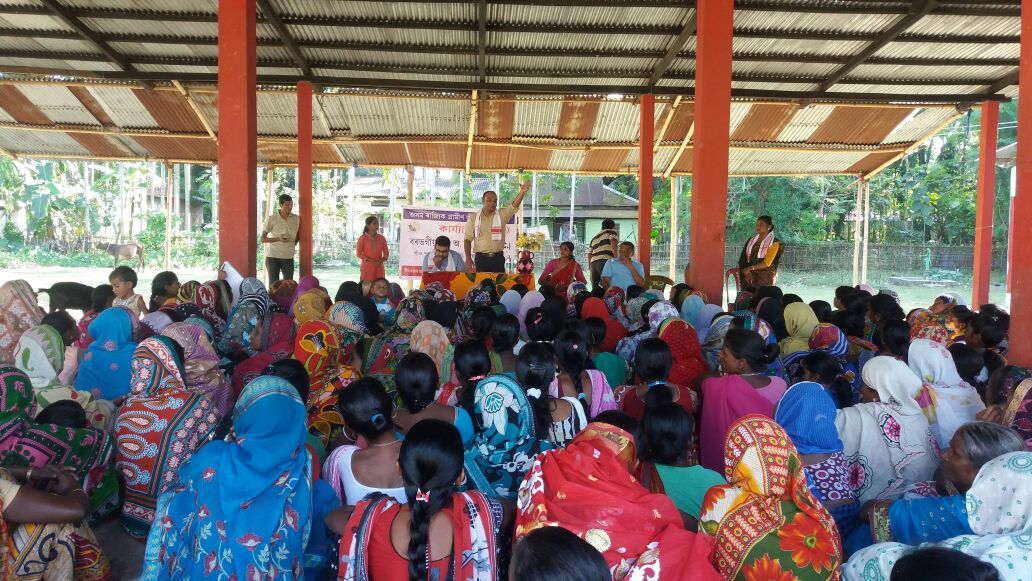
Current Status:- The initiative was started in Borbhogia Gram Panchayat where at present 15 house olds have successfully adopted the model. Subsequently, the model has been replicated to other Gram Panchayats of the block. So far 50 house olds have been covered under 5 Gram Panchayats under Borsola block. The aim is to take this model to 11 Gram Panchayats and to promote healthy eating habits among the SHG families of the block.
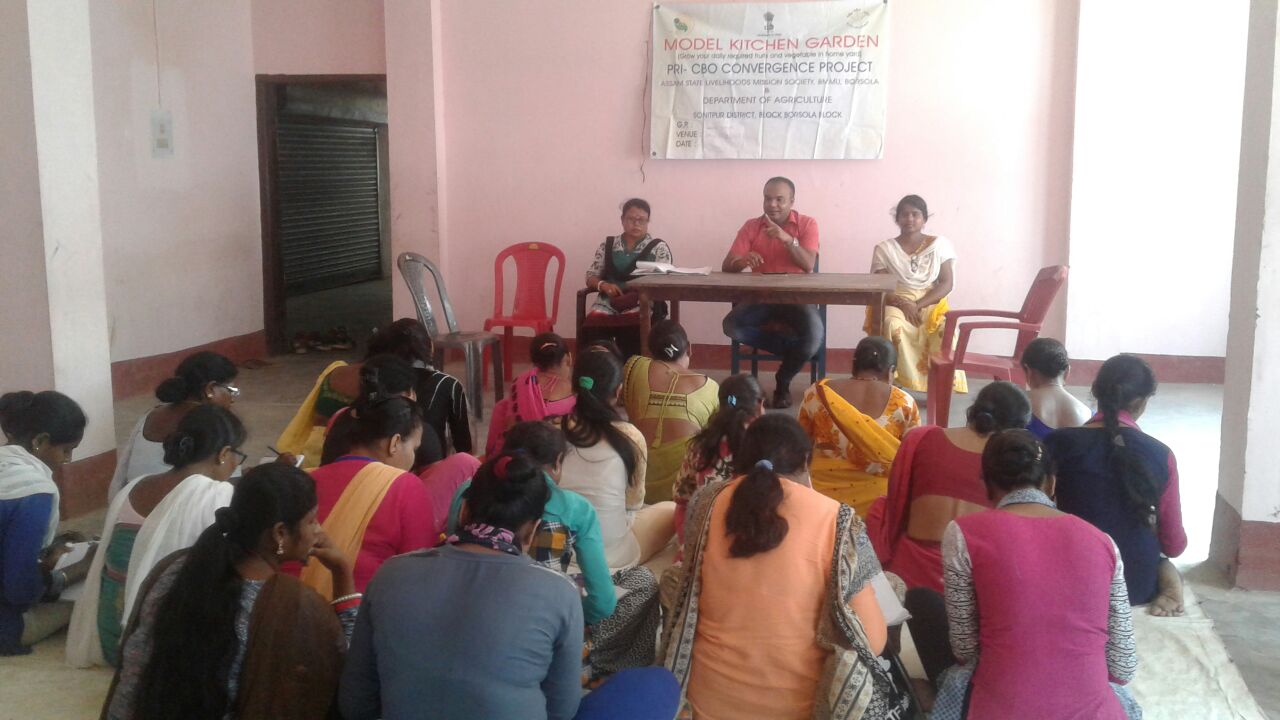
Future Plans:- The model would be expanded to all the 11 Gram Panchayats in the coming months. The initiative would be expanded in a chain where the support from the department would be reduced gradually and SHG members would be taking it up on their own.
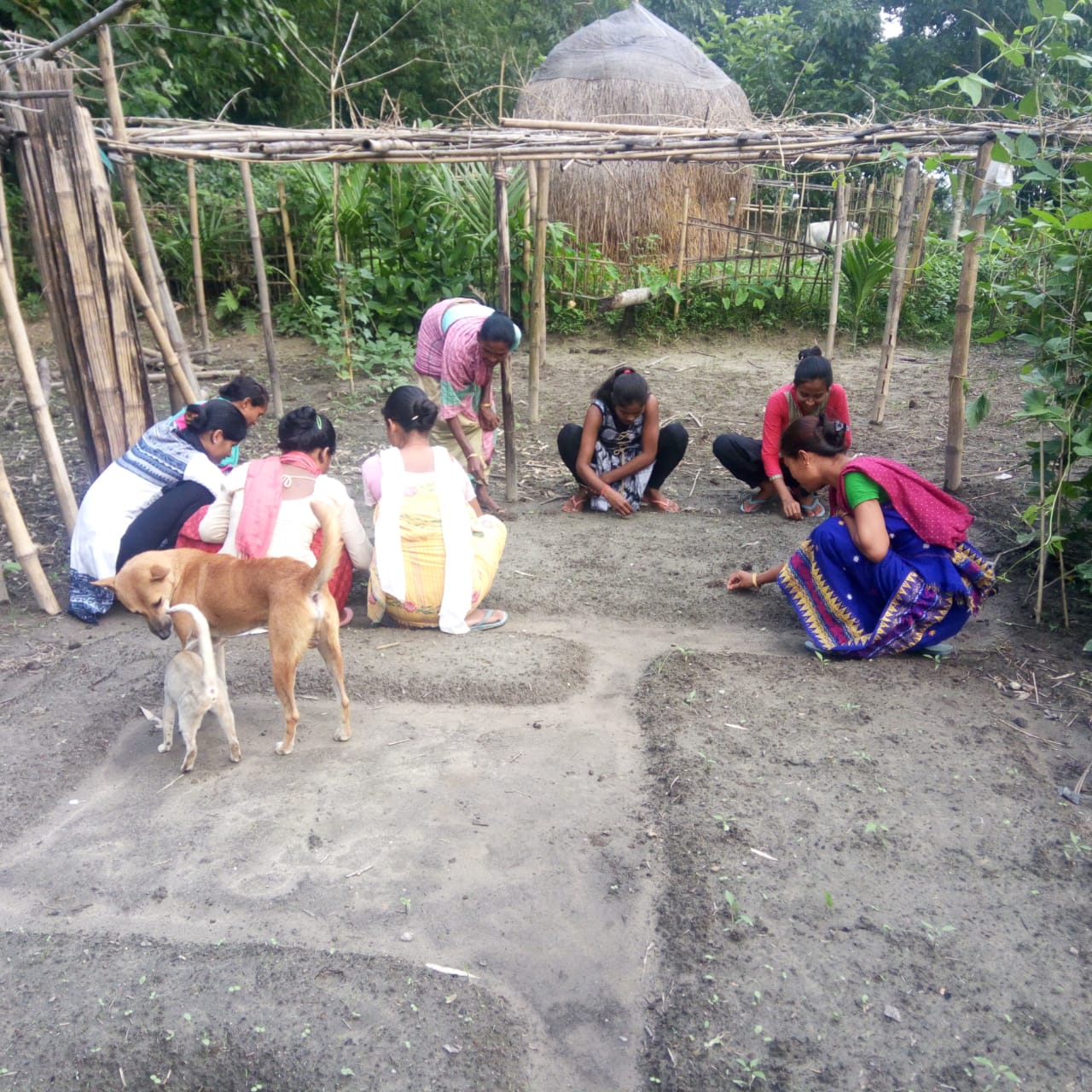
Voices from the field:
“ My back yard not used to be so beautiful as it looks now. Earlier, when the LRG came for survey I was apprehensive about the model. But, after ADO sir gave us the training I got to know the benefit of growing organic vegetables at home. Now, with the passage of time, I am able to feed my children. Also, I don’t have to rely on the market to get vegetables. I want to expand my kitchen garden by planting more seeds for different vegetables. My children are also consuming healthy vegetables and it will also reduce the burden of health related expenditure in my family”- Jolekha, SHG member Gupteshwar Gram Panchayat, Borsola block
“I used to grow vegetables in my back yard since long. But, I was not aware about the nutritional value of each vegetable The training which Agriculture department provided us opened my eyes and I felt that I being the mother of two children should adopt this practise. The model will really help me to grow more vegetables in a systematic manner. I don’t have to go to market now to buy vegetables and now I know the value of growing vegetables in my own land. It gives me satisfaction that the vegetables cooked in my kitchen has no pesticides..................this model should be adopted by all SHG women in my Gram Panchayat.- Sahela Khatoon, SHG member, Borbhogia Gram Panchayat
“Earlier, schemes used to come to the department and it was quite difficult for me and my team to mobilise people for meeting Initially, I was quite apprehensive regarding the success of the model. But, looking at the dedication from Internal Mentors, LRGs, VOCC and External mentor I had to change my mind and support the team towards making this initiative a fruitful one. The mission seemed to be impossible at the beginning but with the support under PRI-CBO Convergence project my role became quite easy because the survey and mobilization was done by Internal Mentors and LRGs. We are able to produce organic vegetables and I am hopeful that in the long run the SHG women would be able to sell their produce in the local markets. Now, we should expand it to all the Gram Panchayats under Borsola block and the model should be taken to other parts of the state.- Zakir Hussain, ADO Borsola block.
“Apna Jeevika Haat”- Evolving rural market space
SVEP, A sub-scheme under National Rural Livelihoods Mission, Ministry of Rural Development, and Government of India) has the main objective to provide rural entrepreneurs with business skills, exposure, loans for starting and business support during the first critical six months of the setting up of enterprises by using the Jeevika SHGs and their federations. In Mushahri, through this program, 890 Micro-enterprises have been supported.
Jhapaha Deeh is a place 500 meters off NH-57 in Sarvottam CLF. The locals here had to travel 5 to 7 km to get access to the nearest market. There was no rural weekly haat, locally known as “Pethiya” in the radius of 5km of this location. In multiple rounds of discussion with CBO leaders, MECs identified the need of a local market in Sarvottam CLF, which would cater to the day to day needs of consumables of the local population. This location caters to the daily needs of rural consumers of almost 8 nearby villages of Bochaha and Musahari blocks.
The local haat was inaugurated with much fanfare on 9th May 2018 by the local MLA Mrs Baby Devi. Members of the CBOs, Jeevika district and block teams as well as the MECs were present on the occasion along with the local people. On the very first day Apna Jeevika Haat witnessed a footfall of 62 entrepreneurs and more than 550 local customers. A total sale of Rs 87150 was recorded on the very first day. Following are the details;
| Sr. No. | Type of ME | No of ME | Average Sale | Total |
| 1 | Fancy store and cosmetics, Decoration | 9 | 1150 | 10350 |
| 2 | Vegetable shop | 22 | 1100 | 24200 |
| 3 | Nursery | 1 | 600 | 600 |
| 4 | Chicken shop | 2 | 3900 | 7800 |
| 5 | Fist stall | 3 | 1550 | 4650 |
| 6 | Kirana and grocery | 4 | 1950 | 7800 |
| 7 | Ice-cream | 2 | 1600 | 3200 |
| 8 | Fruits | 5 | 960 | 4800 |
| 9 | Mutton-Goat Meat | 2 | 4450 | 8900 |
| 10 | Readymade clothes | 1 | 1600 | 1600 |
| 11 | Neera | 1 | 600 | 600 |
| 12 | Nasta and fast food | 3 | 2050 | 6150 |
| 13 | Cool Drinks | 1 | 550 | 550 |
| 14 | Snacks (Vada, Onion Pakoda, Daal pakoda etc) | 3 | 850 | 2550 |
| 15 | Clay Toys | 1 | 760 | 760 |
| 16 |
Gol Gappa |
2 | 1320 | 2640 |
| Total | 87150 | |||
Signs of the Haat being organised on a daily basis
The Haat which was earlier supposed to be organised bi-weekly (Wednesday and Saturday only) now shows signs of becoming a daily phenomenon. The place witnesses sellers coming and doing business daily without any coaxing. It is a result of the impending requirement and the mobilisation done by the MECs. Subsequent per day sales data from the haat inches close to Rs 50,000; which is a promising start.

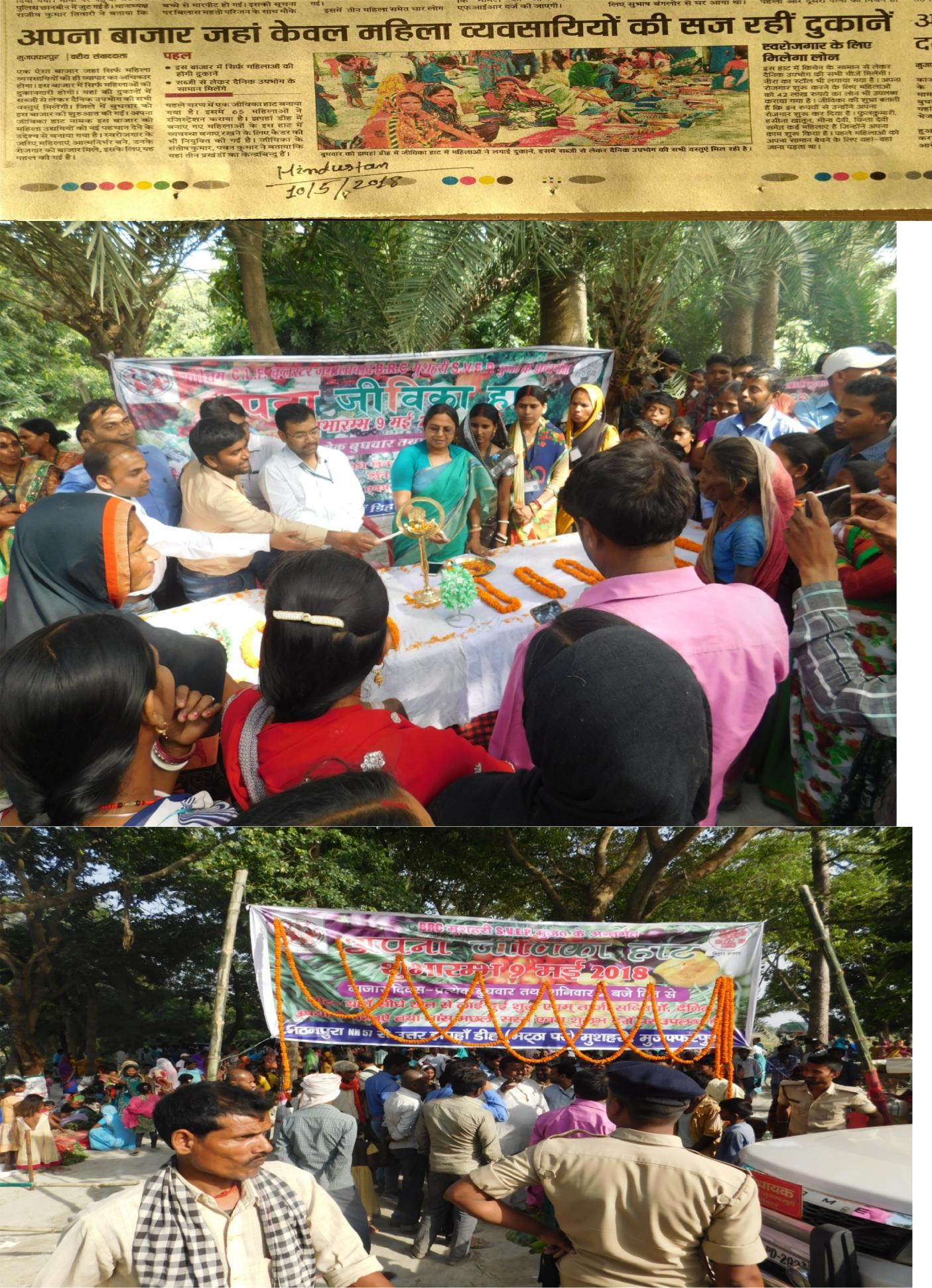

Exhibition organised on Kudumbashree
Kudumbashree reached a major milestone when it completed 20 years of its existence on 16th May 2018. A series of programs like talks, discussions, cultural programs, presentations and exhibition were organised in Kozhikode from 16th to 18th May to commemorate the event. Kudumbashree NRO conducted the exhibition as part of the event which displayed Kudumbashree’s journey through the years and used mediums like display panels, miniatures/sculptures, documentaries and presentations to showcase the work. The exhibition was inaugurated by Shri T.P. Ramakrishnan, Minister for Labour and Excise, Government of Kerala.
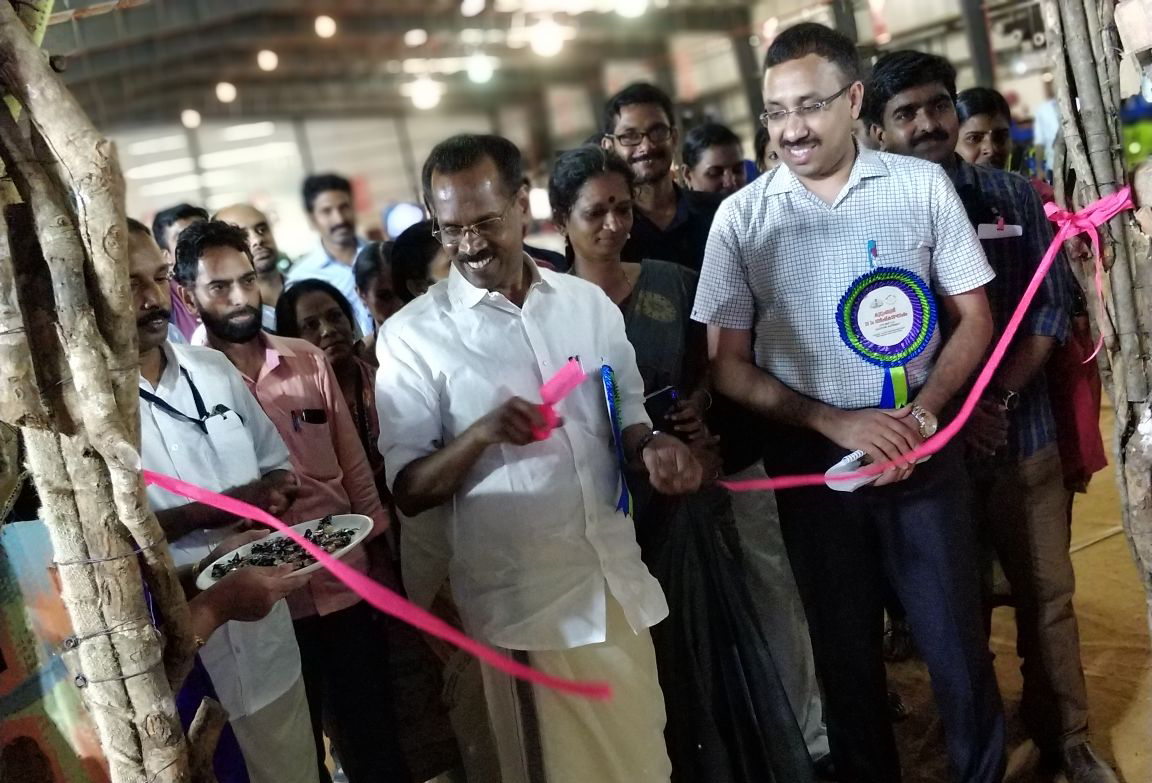
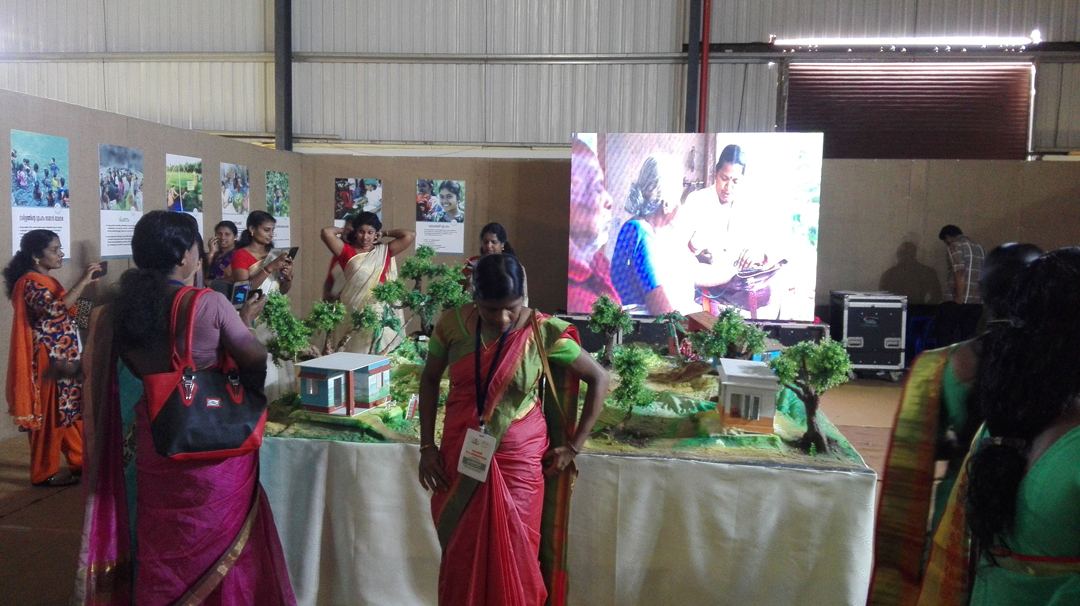
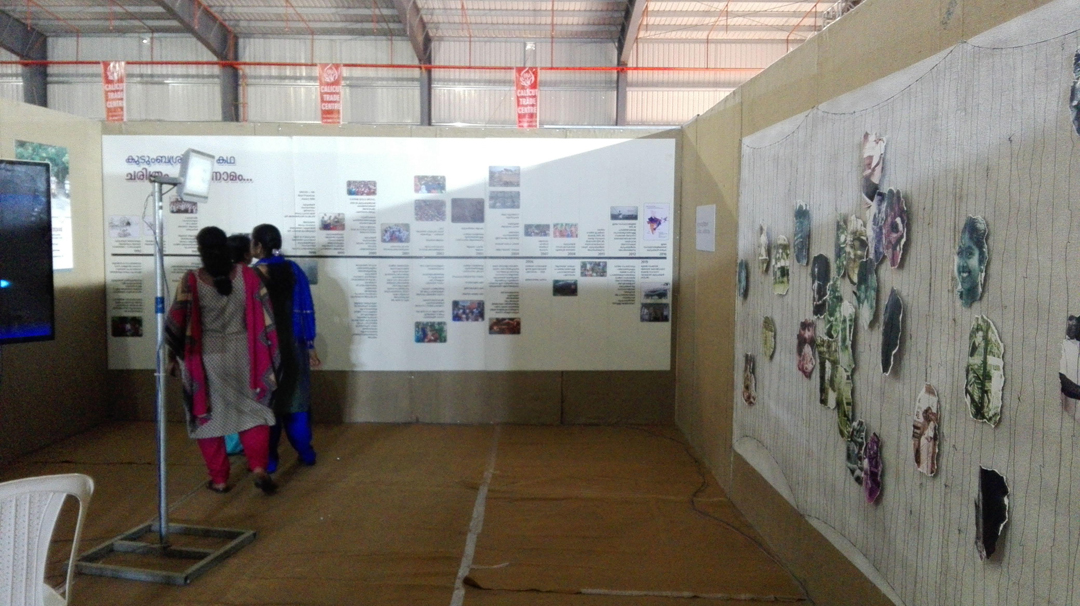
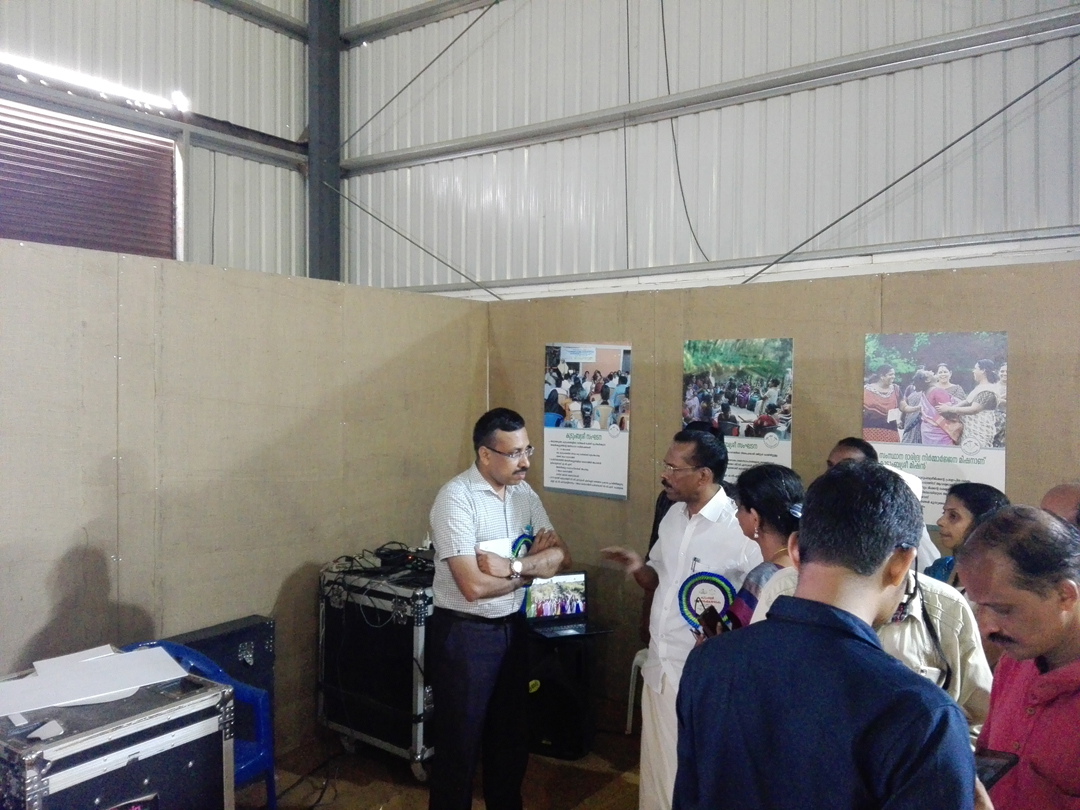
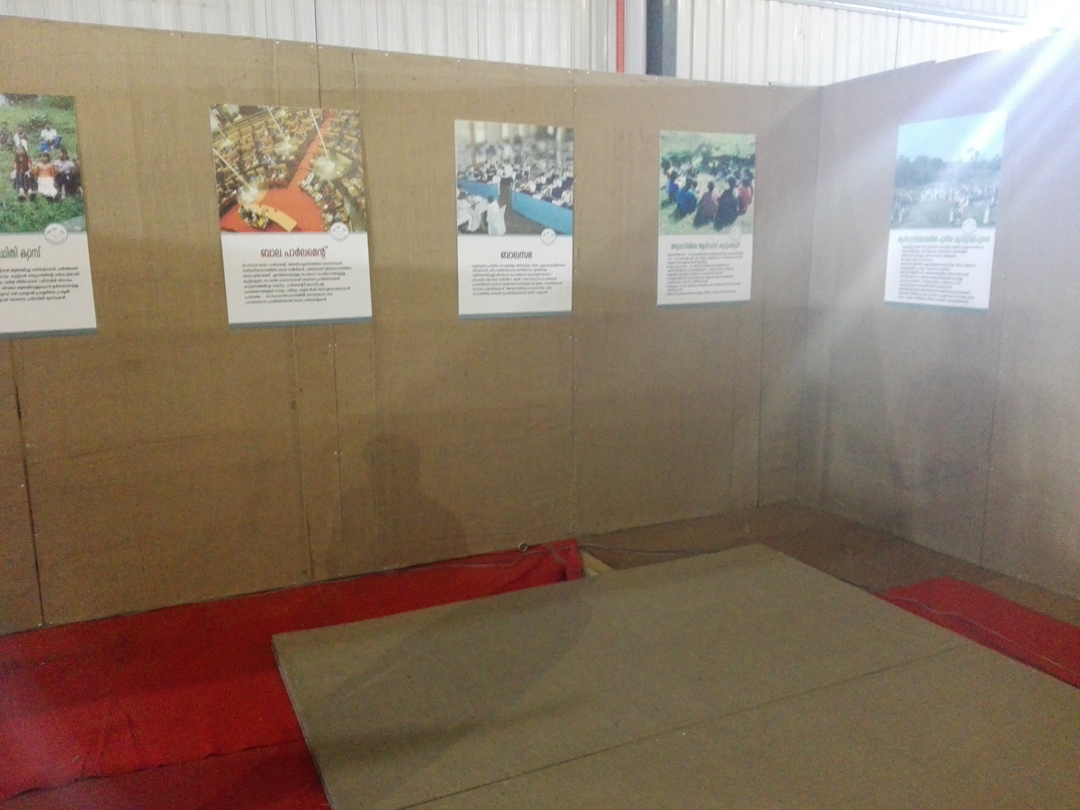
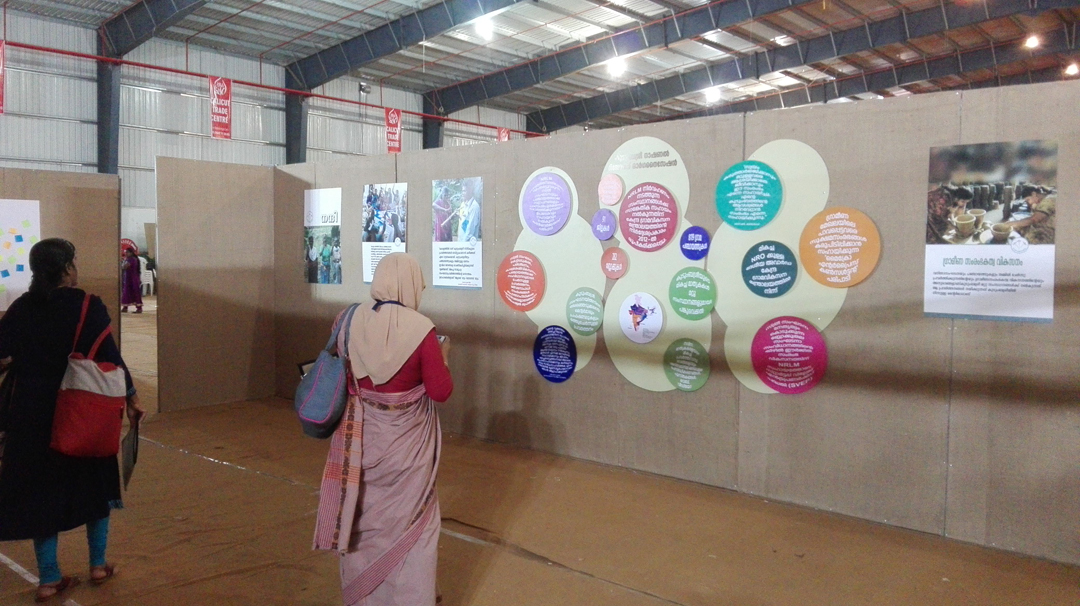
A support of small Kirana Shop can be a panacea - Rani Devi finds a way to earn and support her family
The Story of Rani Devi
Rani Devi lives in Badalagia village of West Singhbhum district. Her village lies on Badlagia-Dopai road which is the only road that connects her block to the other parts of the district. She stays with her husband, a daily wage labourer and their 6 year old daughter studying in class one. Rani Devi could not continue her studies as she was forced to quit after 10th and married off due to family issues. She has always been acitve in her SHG and was also the book keeper of Badalagia Village Organisation (VO).
People from her Panchayat and nearby villages regularly used the Badlagia-Dopai road to reach Khuntpani and Chaibasa. But for people who travel via this road frequently, buying essential daily items was a problems as the only two Kirana Shops that existed were located in the interiors of the village. Rani Devi had been observing this for quite a long time and started thinking “If a Kirana Shop can be opened near the Badlagia-Dopai road, most of the passers-by will not have to walk extra 200 meters to buy things”. Having realized this, she planned to set up a Kirana Shop that will cater not only the frequent travellers but also children and villagers.
With this thought in mind, she started collecting money from various sources such as from her husband, relatives, SHG and VO but she could not get enough money to start the shop. SHG and VO members did not prefer to give her loan citing reasons such as inability to repay the loan, her being landless, not enough earnings by the family etc. Having tried all the alternatives and failing in each step, she was dejected, but did not loose hope. In August 2017, as she was attending an SVEP orientation at VO level, she realised that her dream of opening a Kirana Shop can be fulfilled. Ms Simla, the CRP-EP of the concerned cluster under SVEP, conducted further SHG orientations in her village to give a better understanding on the benefits of starting an enterprise under SVEP.
Rani Devi showed keen interest and participated actively in the discussions and orientation programs. Following which, she also attended General Orientation of Training (GOT) and Business Management Training (BMT) organised by Ms. Simla, the CRP EP. The trainings helped her to understand various aspects related to a business such as competitors, cost of profitability, capital, books of account etc. She felt that the frequent visit of Ms Simla was also a symbol of cooperation, support and comfort. She shared “I was assured that someone is there with me to support and guide me in my business thus without the fear of risk and loss in business I was mentally stronger to start the business “. Ms. Simla supported Rani Devi in conducting a viability study and prepared a business plan for her which was also presented to the Project Sanctioning Committee (PSC) for approval. The committee members including representatives from CLF, CRP-EPs, Kudumbashree NRO mentors and SVEP BPM approved the business plan with cost Rs. 51,500/- which included Fixed capital Rs 22,400/- and Working capital Rs 29,100. The PSC also approved Rs 1500/- as entrepreneur’s contribution and remaining Rs 50,000 was sanctioned as Community Enterprise Fund (CEF) under SVEP. Once the CEF money was released to her account, she and her husband went to Chaibasa town and bought necessary items for the Kirana Shop. They also modified their house by making one side of the wall look like a window and opening to her Kirana shop (as shown in the picture).
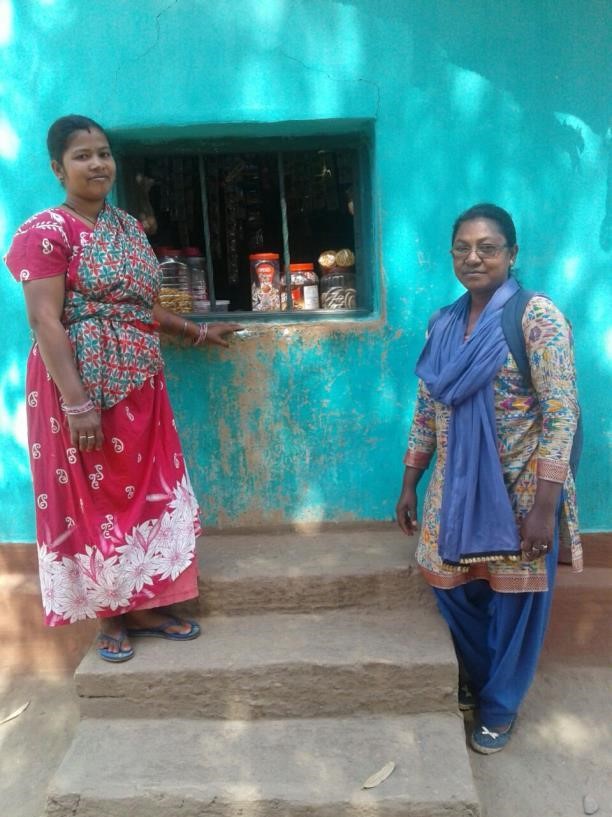
She now sells groceries, toys and other stationery items. The shop fetches her a profit of at least Rs. 4500 to Rs. 5000 per month and as a result she has also started repaying her loan simultaneously. She now feels very happy to have the shop as she thinks it has been not only helpful to her but also for other villagers. Nanika Jamunda, one of the locals who regularly visits her shop stated “Even when we don’t have money we get to buy stuff on credit from Raniji whereas other shops don’t provide this so we feel happy to have this shop in our compound”.
Rani Devi now plans to expand her business and include items like coffins, fancy items for ladies and disposable plates.
Block Project Manager, SVEP handing over the first lot of school uniforms stitched by entrepreneurs in Bihar
Developing entrepreneurial skills for improving livelihood opportunities and accessing a larger market is integral to the implementation of the Start-up Village Entrepreneurship Program (SVEP). MEC groups formed under SVEP address such issues by facilitating linkages between entrepreneurs and training institutes like RSETI offering training and skill up-gradation programs. Seen in the image is the Block Project Manager (BPM) of Dhanarua Block (Bihar) handing over the first lot of school uniforms stitched by entrepreneurs under SVEP to the Principal of a private school. MEC group of Dhanarua Block helped the entrepreneurs in getting them trained in RSETI. The group also arranged the bulk order of school uniform for the entrepreneurs.
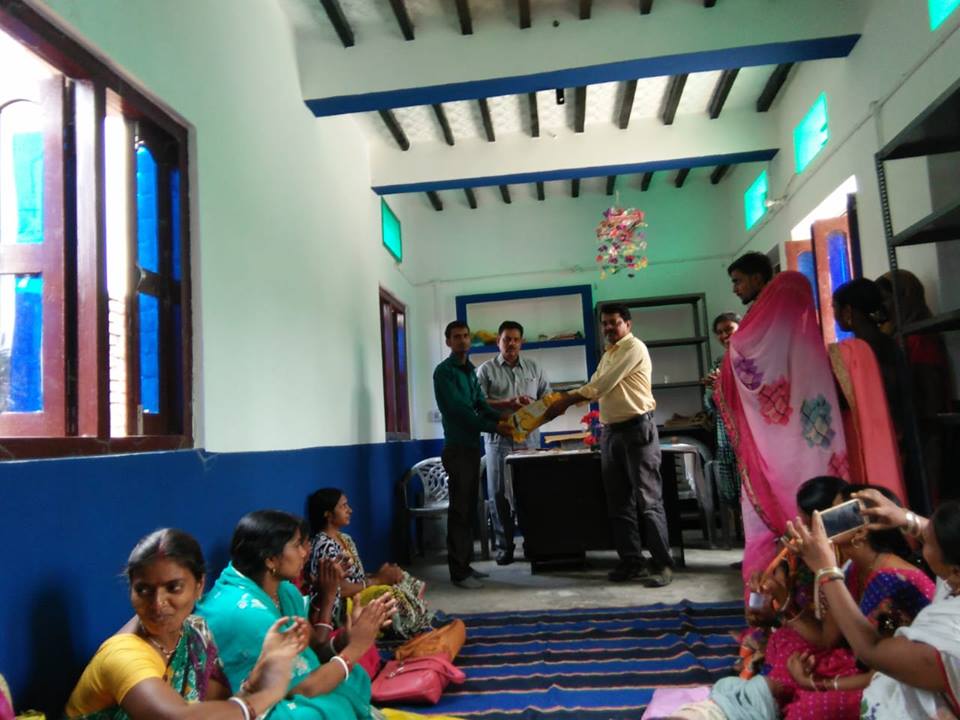
Story of Yeshoda- Expanding wings
As part of enterprise triggering activities, Baby, the Micro Enterprise Consultant working in Raipur block, Rajasthan had inspired Yeshoda, a 22 year old girl from Galliyawadi to start her own enterprise. Both of them had already participated in the food fest conducted by Kudumbashree NRO held in Kerala where they saved Rs. 15,100. With some ideas buzzing in their heads, Baby suggested Yeshoda to start something from the money that she got from the food fest. Yeshoda added an additional amount of Rs. 20000 taken as an SHG loan and Rs. 25000 loan from family members, making her initial investment to Rs. 70,000. With the money, she started a small slippers and dress shop in Galliyavadi on November 10th 2016. Baby supported Yeshoda in in purchase of goods, pricing and business plan preparation. The business gave her good returns which encouraged Yeshoda to add additional capital of Rs. 10,000 to the business. As per Baby’s advice, fancy and other house hold items were also added to the business.
The business now caters to a large number of needs of the villagers and even people from nearby villages. For Yeshoda, who got inspired by the Baby to start the business now feels it has given a new purpose to her life. She earns more than Rs. 10,000 per month and has assets valued at more than Rs. 3,00,000. She started a new branch in a nearby village Kemana which is being taken care by her younger sister Pooja.
Kudumbashree NRO invites applications for various positions in GSRLM
RECRUITMENT ADVERTISEMENT
On behalf of Goa State Rural Livelihood Mission (GSRLM), Kudumbashree-National Resource organisation invites applications from interested candidates for the positions listed below to work with GSRLM in the State of Goa.
1. State Project Manager. IB/CB
2. MIS Manager.
3. Livelihood Manager.
4. Bank Mitra/Bank Linkage.
The general terms and conditions of the service matters along with emoluments and application are mentioned in the attachment.
Interested candidates are requested to send online applications to This email address is being protected from spambots. You need JavaScript enabled to view it. on or before 30th May 2018 before 5.00 p.m.
Empowering women through Adult Literacy Program
Providing opportunities of learning to women who have never been to school, is an essential step towards implementing an inclusive and sustainable development process. A literate woman who is aware of her rights will always be in a position to voice her opinion against discrimination and marginalisation. This is what influenced the staff members and mentors on field to take up the initiative of launching an adult literacy campaign in Barhampur Block of Nagaon district (Assam).
It was while conducting participatory planning exercise under the PRI-CBO Convergence project in the block, mentors realised that women from the Self-Help Groups did not have requisite reading or writing skills. The block, which has around eleven panchayats and 965 SHG’s, had very poor literacy levels among women. As an initial step towards addressing this issue, an adult literacy programme was decided to launch as a mass campaign. The beneficiaries of the campaign were identified through a survey which was conducted by LRGs (Community Cadre) in their respective VOs (Village Organisations). A list was prepared and submitted to mentors, based on which, a detailed plan was chalked out. It was decided that the classes will be conducted in respective villages and as per the convenience of the participants. Flexibility was ensured- both in timings and venue of the classes for an increased participation. In many of the places the panchayat building and anganwadi centres were used for conducting classes. Children from Balasabha studying above 8th std, LRGs (community cadre), college students, volunteers and retired teachers were engaged for teaching the women. The campaign began on November 2017 and came to an end on March 2018.
As an outcome of the literacy campaign, a total of 947 women learned to read and write their names along with the names of their SHG, VO and panchayat. Along with this, women also learned to put their own signatures. A total of 158 teachers supported this program.
For encouraging the initiative, functions for declaring the women literate were organised at VO and panchayat level. At the conclusion of the phase one of the campaign, a huge programme was organised at Block level where 522 beneficiaries came together and declared themselves literate in the presence of the Block Development Officer, Block Project Manager and other Block Mission Management Unit staff members on 21st March 2018.
The second phase of the campaign will also include women from outside the SHG fold and will cover financial and legal literacy apart from the regular literacy initiatives.
